North by Northwest (1959)
Directed by: Alfred Hitchcock
Written by: Ernest Lehman
Starring: Cary Grant, Eva Marie Saint, James Mason, Jessie Royce Landis
USA
AVAILABLE ON BLU-RAY AND DVD
RUNNING TIME: 136 min
THE HITCHCOCK CAMEO: At the end of the opening title credits sequence in a bustling New York City, missing a green city bus that slams its door in his face, anticipating a similar scene in the countryside near a cornfield when a bus door shuts on Roger Thornhill
REVIEWED BY: Dr Lenera, Official HCF Critic
Mistaken for somebody named George Kaplan, advertising executive Roger O. Thornhill is kidnapped by Valerian and taken to the estate of UN diplomat Lester Townsend who interrogates him. Forced to drink bourbon, Roger manages to escape a staged driving accident, but is unable to get the authorities or even his mother to believe what happened. Avoiding recapture, he goes to the U.N. General Assembly building to see Lester, but finds that the diplomat is somebody entirely different. Lester’s henchman Valerian throws a knife which causes Lester to fall dead into Roger’s arms. Without thinking, he removes the knife, making it appear that he is the killer, and flees….
In a way, North By Northwest, one of the greatest comedy thrillers ever, shouldn’t work anywhere near as well as it does, because [and especially after watching all of Alfred Hitchcock’s movies prior to it] it really does come across, at least in parts, like a compendium of Hitchcock’s work up to 1959 – in fact, you could almost call it the Portable Hitchcock, though at its length [the second longest of Hitchcock’s films, and the longest in terms of what was released to cinemas] it’s not very portable. The main premise is The 39 Steps all over again, though of course it’s closer to its semi-remake Saboteur, with a fair bit of Notorious mixed in, but there are bits and pieces reworked from other films such as Foreign Correspondent while the whole thing revels in the cliches that by now were expected from a Hitchcock thriller. But North By Northwest does work, magnificently, and it’s quite possible that it was partially intended as a summation of Hitchcock’s career before he virtually reinvented himself in spectacular fashion with his next film.
Hitchcock had agreed to do a film for MGM, and they had chosen an adaptation of the novel The Wreck of the Mary Deare by Hammond Innes, about a ship that is found adrift with no crew, but writer Ernst Lehman gave up on the idea. He did though, want to write the ‘ultimate’ Hitchcock movie’ and the director remembered a tale told to him back by reporter Otis C. Guernsey inspired by a true story during World War 2 when the British created a fictitious agent who was followed around by the Germans. The script for what was initially called In A North Westerly Direction was Written while Vertigo was being made, and James Stewart wanted to star [MGM wanted Gregory Peck] but Hitchcock wanted Cary Grant, so he waited until Stewart was committed to another film before he officially asked him, knowing he’d have to turn it down. The US government not only vetoed Hitchcock’s idea of Grant sneezing inside Abraham Lincoln’s nose on Mt. Rushmore, but said that the planned chase couldn’t occur on the faces of the actual presidents. He also couldn’t get permission to film inside the UN building, but got a few illicit shots and you can see a man doing a double take upon seeing Grant. MGM wanted the film to lose 15 min and in particular wanted a reunion between the hero and the heroine in a wood cut to almost nothing, but all that was removed, or rather altered, was a line by the censor about: “making love on an empty stomach”. The film was Hitchcock’s most successful in some time and remains one of his most popular.
Our ‘hero’, Roger O. [the ‘O’ stands for nothing] Thornhill isn’t the nicest guy at first- we first see him bundling his secretary into a taxi which someone else was about to enter – but one of the film’s joys is seeing the life of this complacent, smug, advertising executive being totally ruined, and he being transformed into a better person as a result. He likes to drink, unsurprisingly, but the usual Hitchcock idea of someone giving someone else some booze to make them feel better is turned on its bed when the villains pour brandy down him and try to stage a car crash. Roger regains control of the car and we get the film’s first example of its brilliant mixing of fear and humour, Roger being totally drunk and barely able to drive. He could crash at any moment, and his blurry POV is visualised, but it’s still somewhat funny [and what a great drunk Grant makes, his accent slightly changing] and even absurd. The back projection, as it is throughout the film, isn’t perfect but much better than that in, say, The Man Who Knew Too Much. Then soon after, once Roger has sobered up and been given bail by his long-suffering mother, we get a great version of the already cliched scene of the hero taking people to the place where he was kidnapped and everything being different, then a wonderful sequence in the lift, again mixing menace and laughter, as Roger and his mum [and Grant and Jessie Royce Landis make such a great double act, despite him only being ten years younger than her] are trapped with two bad guys amidst some other people, and mother says to the villains: “You’re not really trying to kill my son are you”?, prompting the baddies, then everyone else, to burst into laughter.
North By Northwest really is almost one great scene after another, yet its plot moves fluidly and never seems bogged down, the 40 min set up for the ‘chase’ that takes up the majority of the rest of the film actually handled as deftly as possible considering how convoluted the story quickly becomes. It’s actually nice to take a breather after Roger, framed for a murder, escapes onto a train, and here we get a seduction sequence that is astonishingly frank when he meets this mysterious woman [this one doesn’t so much have fire under her ice as just have lots of fire] who makes it quite obvious she wants to bed him immediately, and yet – yes, it’s frank – but is still full of that sophistication and sheer class you just don’t get much of in movies now. When they kiss, they seem to turn round and round against a wall, something that in real life would be ludicrously uncomfortable, but the staging, the photography, the scoring, the dialogue and the acting combine to create a powerfully romantic spell, sure proof that, if anyone required proof, that Hitchcock was a master of movie romance too [and this in a film whose crude final shot is of a train going into a tunnel].
Then of course we get the famous crop duster scene where Roger is attacked by a plane. It’s the careful build-up to the scene rather than the actual attack itself that makes it so brilliant, right from the first shot of the scene showing Roger from a distance, a tiny speck in the middle of nowhere, alone, vulnerable and a million miles away from his normal environment. The exciting [though the actual fight is over a little too quickly] climactic chase over Mt. Rushmore is actually extremely silly, but by now Roger has progressed from ‘everyman’ to pretty much ‘action hero’ as he escapes a hotel room through the window Bourne style [this bit ends in a really tasteless but, yes, still funny moment when Roger clambers into another room where the woman in there twice cries “stop”, as if she fears he’s going to attack her, the second utterance not being at all panicky] and clambours all over the outside of the main villain’s house. Watching North By Northwest again, it’s so obvious how this film influenced the James Bond films, with its debonair hero with a knack for witty remarks and fondness for liquor constantly escaping danger at every turn, implausible action set pieces in outrageous locations, dumb villains who bungle loads of oppurtunities to just shoot the hero, and – perhaps more than anything else, the overall style and tone of the films which certainly didn’t owe much to the Ian Fleming novels.
Amongst all this, the film makes you care about the unorthodox love story despite Eve’s questionable morals and unabashed lustfulness, but then we also get an obviously gay villain in Leonard who has, as he calls it: “a woman’s intuition” and clearly has a ‘thing’ for the main bad buy Phillip Vandamn. It’s the sort of thing that many would complain about in today’s supposedly progressive, but actually restrictive, times, but adds to the Kafka-esque, even Freudian nightmare feel, despite the light tone, of a story where everyone, from his mother [though she’s really an unusually sympathetic mother for a Hitchcock film] to the cops to girlfriends are out to get our hero. This really is the genius of North By Northwest – it’s often at its most frightening when it’s at its funny, something no better illustrated by its auction scene where Roger is trapped and hilariously makes trouble so the cops are called – and, though it would have been nice light relief to make after the intensity of Vertigo, it retains just some of that film’s concerns, such as identity, inadequacy and a distrust of women. Of course much of the best comedy is rooted in seriousness and even darkness.
Hitchcock, who of course worked closely with the screenwriters of all his films, and Lehman often differed on who was responsible for what, but one thing is certain – Lehman’s script, which only stumbles a little in one expository, if necessary, scene explaining who ‘George Kaplan’ is is simply superb: sharp, witty, and aware of the film’s own absurdities without degenerating into actual parody.
Phillip Vandamm: Mr. Kaplan, you are quite the performer. First you’re the outraged Madison Avenue advertising executive who claims that he has been mistaken for someone else. Next, you play the fugitive from justice supposedly trying to clear himself of a crime he knows he didn’t commit. And now, you’re the jealous lover spurned by love and betrayal.
Roger Thornhill: Apparently the only performance that will satisfy you is when I play dead.
Phillip Vandamm: Your very next role, and you’ll be quite convincing, I assure you.
Watching a film like this, one becomes aware of how lame many of the scripts for modern movies are, how dialogue has become mostly functional. Of course, it helps that it’s delivered by people like James Mason, the kind of velvet-voiced actor who could make even the crap that E. L. James writes sound good, and Cary Grant. The two great stars play every scene they are in together matchlessly, helped of course by the clever staging, right from their very first meeting where they basically size each other up as the camera circles round them, and Mason’s character is given some depth – the viewer actually feels his hurt when he finds out that his girlfriend has betrayed him. This film is also a career summary of Cary Grant’s talents: verbal comedy, physical comedy, action star, romantic star, and, yes, though he isn’t generally thought of as such, dramatic actor. Eva Marie Saint makes her slightly awkwardly written [she’s like a weaker version of Ingrid Bergman’s in Notorious] character almost believable and Leo G. Carroll, in his final appearance for Hitchcock, basically plays a forerunner of his Mr. Waverley from The Man From UNCLE TV and film series.
Bernard Herrmann’s deceptively simple score is largely based around a fandango which re-occurs with many variations throughout. His immediately catchy, rhythmic main title music combined with Saul Bass’ title sequence of the hustle and bustle of New York reflected in a skyscraper, gets the movie off to a great start. Contrasted with this is a plaintive love theme, a [probably deliberate] variation on Wagner’s Tristan and Isolde main Leibestod theme, which is given an appropriately train-like rhythm for Roger and Eva’s first encounters, and much menace, some of it appropriately semi-comedic. If Rear Window is Hitchcock’s most perfect film, and Vertigo is his most artistic [while a certain other film I haven’t quite got to yet is his most chilling], then North By Northwest has to be his most sheerly enjoyable. No matter how many times you watch it, it never fails to cause excite and amuse, an evergreen classic that is often completely illogical if you think about it but is a near-perfect exercise in old school movie magic and escapism during its duration, and that’s certainly enough.

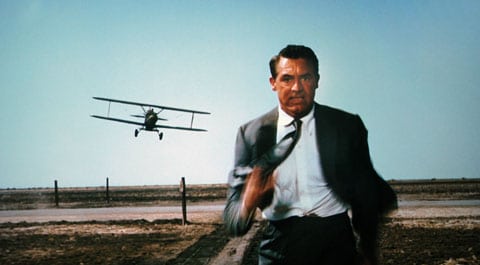
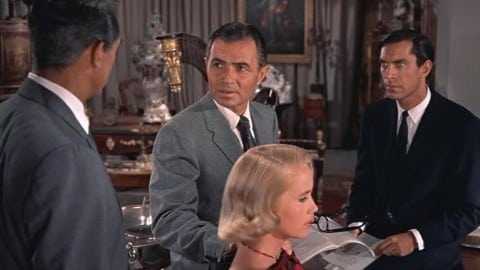
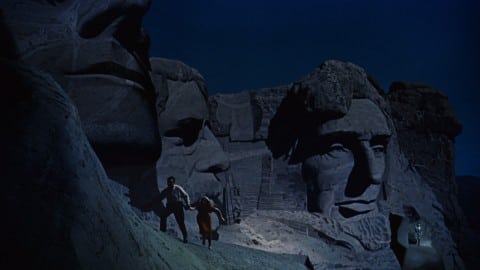



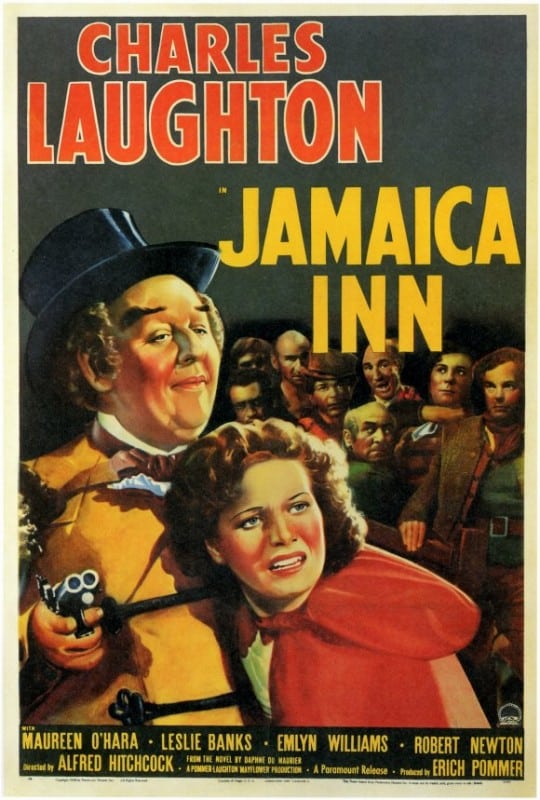
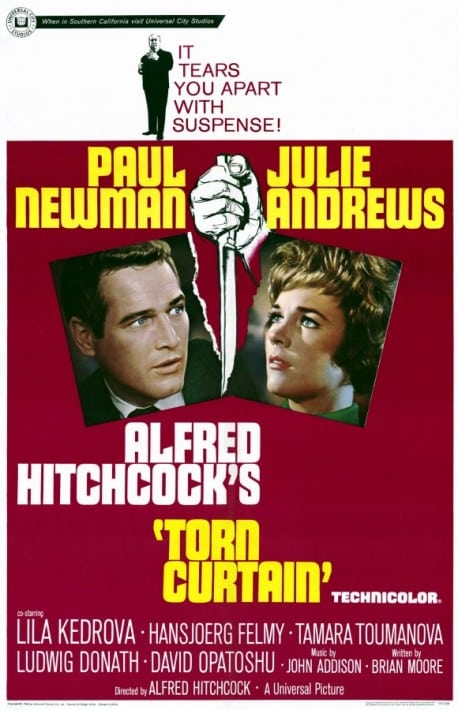
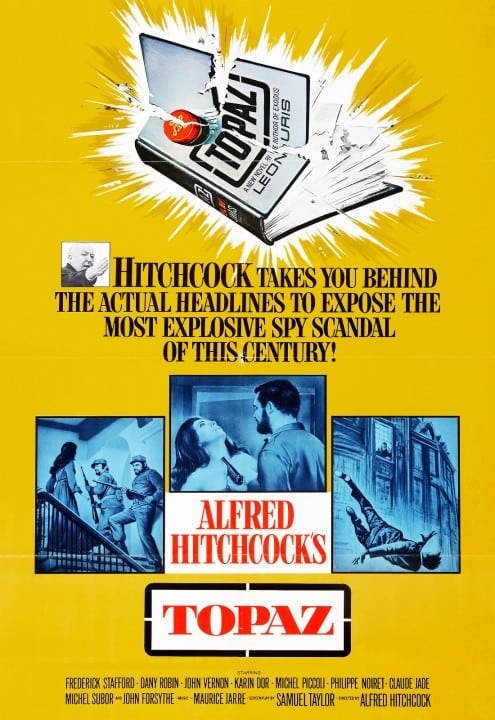
Be the first to comment